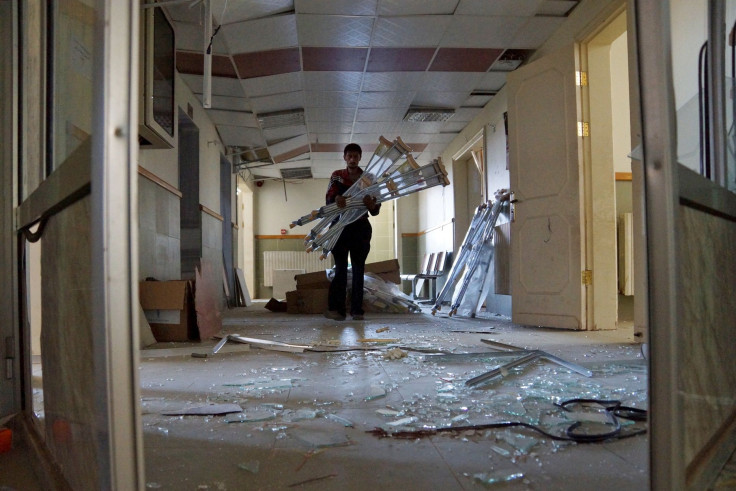Russian Forces Strike Syria's Southern Rebels In Preparation For Pro-Regime Ground Offensive

BEIRUT -- Russian warplanes in Syria reportedly hit the southern province of Daraa Thursday, the first time the rebel-held province, the birthplace of the Syrian revolution, has been targeted since Moscow began its air campaign in the war-torn country. Russia has been hitting Syrian opposition and Islamic State group targets in Syria’s northern provinces to aid forces loyal to Syrian President Bashar Assad in making territorial gains.
The strategy suggests Russia’s unprecedented attacks in the south are a precursor to a large-scale ground operation to retake a strategic area that borders both Jordan and Israeli-occupied Golan Heights. Russia began its military campaign in Syria targeting terrorist groups like ISIS and Jabhat al-Nusra, but Moscow’s airstrikes in Daraa make clear all opposition forces are targets.
“The Russian strikes … have confirmed that the quadripartite coalition [sees] everyone bearing arms [against the Syrian regime] as an enemy of the Syrian state,” the pro-Syrian regime and Lebanese Hezbollah-linked newspaper Al-Akhbar reported Thursday.
Among the various rebel groups operating in Syria’s southern province are moderate opposition forces that were part of the United States’ defunct train-and-equip program who received TOW missiles. Rebel groups belonging to the Free Syrian Army seized the area last year, and since then pro-regime forces have made numerous attempts to regain the strategic territory.
On Wednesday, Russian planes struck the Tal Hara, Tal Antar, Kafr Nasaj and Aqraba neighborhoods of northern Daraa, according to the U.K.-based Syrian Observatory for Human Rights. Iran's state-run news agency claimed Russia’s targets were al Qaeda affiliate Jabhat al-Nusra militants.
Syrian Civil Defence, a volunteer rescue organization in Daraa, said airstrikes targeted civilian and rebel-held positions. One strike targeted the main road in Daraa city and hit a civilian vehicle, injuring four men and killing one, the Daraa media liaison for SCD told International Business Times.
New Offensive
Russian airstrikes indicate a pro-regime ground offensive could take place in coming weeks and is likely to draw in foreign troops from Lebanon and Iran. Earlier this month IBT reported Iran was planning to send roughly 1,000 fighters from its IRGC Quds Force to be stationed in Daraa.
“All indications [suggest foreign forces] will come down. You will see Russian troops and Iranian troops,” a senior Hezbollah official told IBT.
Regime ground forces and their allies are massing in the area in preparation to retake the Daraa triangle, an area of roughly 60 square kilometers that stretches southwest of the Syrian capital Damascus to southern Daraa city and back up to Quneitra in the Golan Heights.
Troops from the Syrian army’s 5th armored and 7th mechanized divisions along with fighters from the pro-regime National Defense Forces were deployed to Daraa’s northern countryside earlier this week, al-Masdar news reported.
Syria’s Southern Borders
Among Wednesday night’s bombardment were targets some 15 km from the Israeli-occupied Golan Heights and others on the border with Jordan.
A report from the Institute for the Study of War said if confirmed, Russian airstrikes "in southern Syria could be a sign of Russian cooperation with Israel and Jordan. … Alternatively ... the strikes could represent an escalation against Syria's southern neighbors.”
Jordan and Israel, two important American allies in the fight against ISIS, share borders with Syria’s southern provinces, potentially dragging them into the conflict if Russia persists with its bombardment of the south. Both countries, which backed the U.S. strategy to support moderate Syrian opposition groups, have already discussed military cooperation with Russia.
Last week, Russia and Jordan met and agreed to coordinate their operations in Syria through a "special working mechanism" in the Jordanian capital of Amman. Israeli Prime Minister Benjamin Netanyahu traveled to Moscow to discuss how the two countries could operate in Syria without getting in each other’s way. Israel has been monitoring the situation closely as Iran and the Lebanese Shiite militant group Hezbollah increase the number of weapons and their presence on the border.
Netanyahu said an increased number of Iranian troops deployed to the south for the battle for Daraa is not good news for Israel during the meeting in Moscow, according to a transcript released by his office.
“Iran, under the auspices of the Syrian Army, is attempting to build a second terrorist front against us from the Golan Heights,” Netanyahu said.
© Copyright IBTimes 2024. All rights reserved.






















